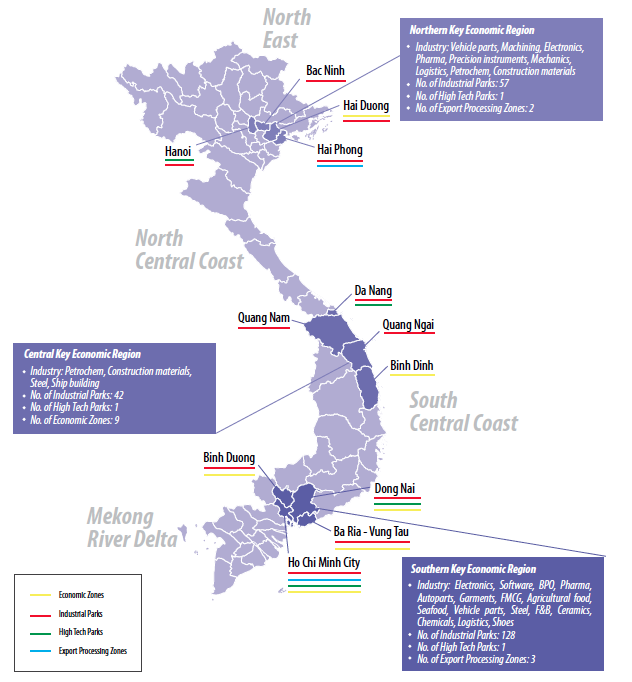Why are Special Economic Zones so attractive to Vietnam’s government, despite proven shortcomings?
The Vietnamese government sees special economic zones (SEZs) as the most important source for future economic growth momentum and breakthrough institutional reforms. Unfortunately, as I analyzed in the first part of this series, the dawn of the Vietnamese SEZs does not appear very bright. There are few weeks left for the Vietnamese public and the National Assembly to debate the SEZ law, which is expected to be approved at the next session. It’s worth reviewing the draft law as well as looking back at the existing economic zones in the country to identify major issues and enduring lessons for the government in its approach to SEZ development – a huge economic gamble that has already been tried and abandoned in the past.
Why SEZs?
After three decades of attracting foreign direct investment (FDI), Vietnam has established 18 coastal economic zones with up to 325 state-supported industrial parks throughout the country. They were designed to offer a wide range of incentives to investors, including tax breaks (or even zero tariffs) on selected items, lower or exempted corporate income tax, and reduced rents and fees. Since the majority of the agricultural land seized for industrialization still remains unused, the existing economic zones still have open space for foreign investors. So why does the government want to introduce more economic zones?
A close look at the domestic context and politics helps explain Hanoi’s determination to develop SEZs.
First, Vietnam’s government is inspired and encouraged by the miracle development of some SEZs in China, the UAE, and Singapore. Second, fresh momentum for domestic economic growth is critical amid global changes prompted by the Fourth Industrial Revolution and new-generation trade agreements. Third, the government and provincial authorities have already offered the most favorable incentives they can, but failed to attract as many high-end manufacturers, new technologies, and modern management know-how as they wish. Meanwhile, possible land and mineral resources for traditional industries are being overexploited, causing more and more negative impacts on environmental and human security.
In addition, many bilateral and multilateral free trade agreements (FTAs) that Vietnam has recently signed, such as the Vietnam-EU FTA and Comprehensive and Progressive Trans-Pacific Partnership (CPTPP), will come into effect shortly. Those FTAs, among other things, will sharply reduce tax revenues and increase public debts in Vietnam, due to commitments to remove taxes and what some called the “free trade trap.” Thus, setting up new economic enclaves presents a clear alternative to sustain the state coffers. It is estimated by the Ministry of Planning and Investment that the SEZs would bring in over $10 billion each year from tax payments and land-related fees.
Moreover, since Doi Moi, the Communist Party of Vietnam (CPV) acknowledges material productive forces and the coexistence of private capitalists as the driving forces behind economic progress and the necessary prerequisite for the early stage in the traditional Marxist framework of developing socialism. Yet the current socialist-oriented market economy has shortcomings and remains unable to meet greater demands for both “neoliberal socialism” and global integration. Pervasive corruption and high-profile failures of state-owned enterprises (SOEs), which play a decisive role and form the backbone of Vietnam’s socialist economy, highlight the vital need for institutional reforms. Accordingly, the proposed coastal SEZs in Van Don, Bac Van Phong, and Phu Quoc Island, which have clear geostrategic strengths and are rich in natural resources, appear to be the best choices to serve as the government’s “institutional trial incubators” at the moment.
Source: https://thediplomat.com/2018/09/sezs-in-vietnam-whats-in-a-name/

Vietnam's Industrial Zones
Contact us to get insight into SEZs and Industrial Parks in Vietnam.

